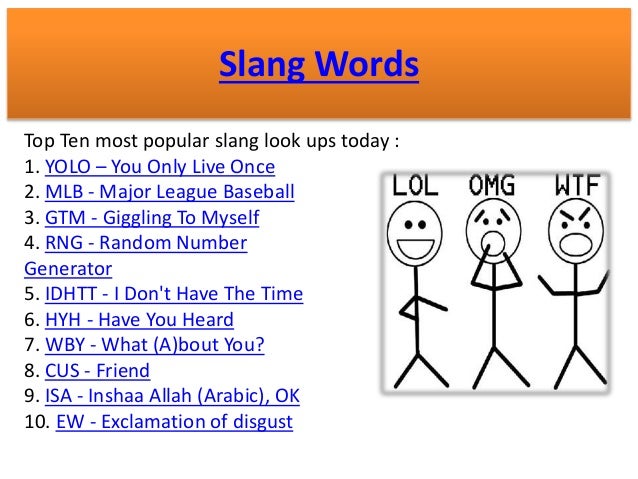

Internet slang has gained a “novelty” effect through its anticonventional nature, which is why non-normativity is its defining characteristic. Internet slang often borrows foreign words, dialects, digital elements, and icons it also frequently integrates the use of paraphrasing, homonyms, thumbnails, reduplication, and other word formation methods and unconventional syntax ( Kundi et al., 2014). Internet slang as a variant of SL (e.g., English, Chinese, and German) ( Collot and Belmore, 1996) is informal, irregular, and dynamic.

In this research, internet slang is regarded as a variant of SL because it is normally related to word choice or morphology and syntax. Speakers may use distinct pronunciation (accent), word choice (lexicon), or morphology and syntax. Language variation is a core concept in sociolinguistics ( Chambers, 2008) and a characteristic of language, which means there is more than one way of saying the same thing. The emergence of internet slang is a result of language variation. These findings enrich both language and advertising communication theories. Second, this work examined the advertising effect of internet slang from the attention perspective according to code-switching theory by using embedded language and eye tracking. First, it adds to the literature related to advertising effect of languages, our work demonstrated the complex effects of internet slang on advertisements. This research makes several notable contributions. The study also addressed whether internet slang is always has a positive effect on such evaluations. Therefore, this study explored people’s attention and evaluations (such as product evaluation and brand awareness) when encountering internet slang in various types of advertisements for products. In this study, we posed the following question: Is internet slang suitable for every product? It is possible that overusing internet slang in advertisements may yield unfavorable results, although such slang might attract more attention compared with standard language (SL). Internet slang has attracted the attention of corporations and its widespread use continues to grow. On the internet, a catch phrase or an incident can be publicized overnight, such as the expression “prehistoric powers” introduced by the young Chinese swimming athlete Yuanhui Fu or the emerging blend “Brexit” referring to the UK public vote for departure from the European Union.
#Chat slang tv#
For example, a popular online video featuring a character from an American TV show saying the phrase “Cash me ousside, howbow dah” (“Catch me outside, how about that?”) went viral because of the strong accent and rebellious attitude of the character. Some internet slang originates from the news, movies, TV programs, or online videos. McDonald’s, for example, used the internet slang “么么哒” ( Mo Mo Da, a mimetic word for kissing) to promote its “Ice Cream Day,” because this word expresses ideas such as cuteness, proximity, and delightfulness. Corporations have also started employing internet slang in public communications. People’s communicative behavior, language, and psychology have all been affected by the subtle influence of internet slang ( Crystal, 2006). Our findings also indicate that the excessive use of internet slang may have a negative effect on brand and product evaluation.Īs society and the economy continue to develop, internet slang has shifted from being a mode of communication to being an everyday language. Our findings can guide advertisers in selecting the embedded language that can be effective in achieving their desired advertising effect. We discovered code-switching effects of psycholinguistics existed in standard language and its variant (internet slang). We found that using internet slang in advertising significantly increased audience attention compared with standard language but did not necessarily improve product evaluation and brand awareness for various types of goods. In this study, we examined the effect of the characteristics of internet slang on attention to advertisements, brand awareness, product evaluation, and attitudes toward advertising by conducting two empirical studies, one utilizing eye-tracking experiments and the other utilizing questionnaires. Embedding internet slang into advertisements can thus enhance their creative quality and increase the attention paid to them. Internet slang is a new language with innovative and novel characteristics, and its use can be considered a form of creative advertising. Department of Marketing, College of Management, Shenzhen University, Shenzhen, China.Shixiong Liu Dan-Yang Gui * Yafei Zuo Yu Dai


 0 kommentar(er)
0 kommentar(er)
